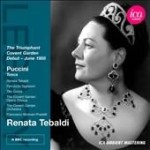This recording, from the BBC vaults, documents Renata Tebaldi’s Covent Garden debut (or, more specifically, the second night of her debut season), in later June, 1955. She is joined by the distinguished and beloved Ferrucccio Tagliavini and Tito Gobbi, and if the whole somehow manages to amount to less than the sum of its parts, it still has the most formidable parts.
Tebaldi’s voice is remarkably fresh and secure, with all five high Cs in place and offering no problems; the registers are perfectly knit and the sound grand, beautiful, and womanly. She cheats in the “Ora stammi a sentir” monologue by traveling up to and down from the soft B-flat staccato rather than connected, as it’s written (I’ve heard Leontyne Price do the same, and it still isn’t right), which is easier for opulent voices, but elsewhere she is the very model of a major Tosca. If her jealousy, outrage, regality, anger, and desperation are all a bit generic, well, she wasn’t the amazingly insightful one–she was the one with the gorgeous tone. But her timing, sincerity, dramatic intensity, and true Italianata are non-existent nowadays and her sheer “prima donna-ness” is grand. “Vissi d’arte”, even with some odd rubato, is ravishing; it almost sounds new here, and the very sedate Covent Garden audience reacts with an ovation.
By 1955 lyric tenor Ferruccio Tagliavini, nine years Tebaldi’s senior, had taken on heavier roles like Cavaradossi and left comparisons with Tito Schipa behind. We get little of the amazing sweetness that filled his recordings of, say, L’amico Fritz and La sonnambula, although his “E lucevan le stelle” is exquisitely sculpted. The voice responds to the heavier singing, if with some leather, and his top notes are effective–and he is, as he always was, inherently musical. He and Tebaldi are all we could want in the last act; I’m surprised that the audience does not erupt with joy more than once.
Tito Gobbi of course is sui generis. From his opening, snarling statement in church, through his lascivious, sneering, “Ebbene” and disgusting “Tosca, finalmente mia” and even beyond, he terrifies. Dangerous, potent, and able to shade his tone from huge and menacing to intimate and oily, he still is the man to go to for Scarpia’s dreadful outpourings. He is in his best voice, and anyone familiar with his 1953 recording with Callas will welcome yet another go-round of evil personified from him.
I recall that Francesco Molinari-Pradelli was somewhat of a routinier in the late ’60s and ’70s, and I’m not convinced that he’s much better here. He rushes both tenor and soprano through the Act 1 love duet at a time in their careers when some fine morbidezza and long breaths were at their fingertips. Yes, it keeps things moving, but it doesn’t get us to see the lovers at their most carefree and adorable. Contrarily, some tension flags in the second act. But I carp. If you love Tebaldi you’ll adore her here in this gloriously sung and very committed reading. The sound is blaring but acceptable.
Of course, the recording of choice remains the Callas/de Sabata, but the relatively newly-released 1962 Met performance with Corelli and Price is a roof-raiser and is also highly recommended.
































